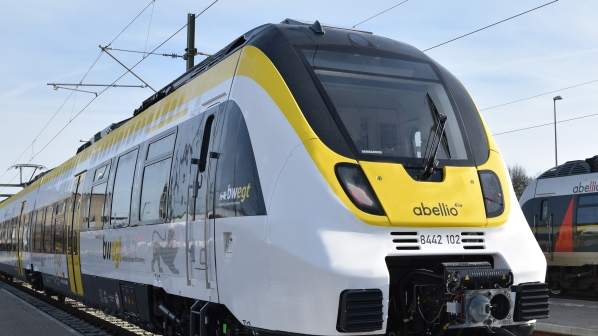Abellio ordered the EMUs from Bombardier to operate services on the Stuttgart Neckar Valley network, after it was awarded a 13-year contract over incumbent operator DB Regio in 2016, but Bombardier has so far delivered only 19 of the 41 EMUs that were due to be delivered before the start of the 2020 timetable on December 15.
The operation handover and introduction of new trains was split into several stages with services due to be introduced in three phases in June 2019, December 2019 and June 2020.
Bombardier had promised to deliver the delayed EMUs, along with seven EMUs as scheduled in June, but Abellio says it has strong doubts about the manufacturer’s ability to meet this deadline.
“Based on the production documentation and the impressions that we have gained from the progress of production at Bombardier, we believe that a complete subsequent delivery of the 22 Talent 2 vehicles that are still outstanding by June is unrealistic,” says ABRB CEO, Mr Rolf Schafferath.
“In order to keep the operation on our current and future lines stable, regardless of the actual scope of delivery, we are already working on another replacement concept. We are supported by the State Ministry of Transport.”
Bombardier repeatedly failed to meet delivery commitments last year, making it more difficult for Abellio to launch its services in Baden-Württemberg.
Timeline
Bombardier was due to deliver 16 five-car trains by June 2019, followed by 25 three-car trains by December 2019. Another seven were due to be delivered by June 2020, with the remaining four delivered in autumn 2020.
In February 2019, only around four months before the start of operation, Bombardier officially admitted for the first time that there would be a delay in delivery, with only 10 of the first 16 trains delivered on time. This was reduced to six in April 2019, and in May Bombardier announced that it would only be able to deliver two ready-to-use trains by early June 2019. These two trains were handed over to Abellio five months late and just a few days before the launch of the first of the new services on June 9 2019.
Bombardier said it would deliver 13 of the missing EMUs by early August, with the last five-car trains delivered in December 2019, but in July 2019 announced it would only deliver 11 trains by early September. On September 9, the manufacturer delivered eight multiple units, giving Abellio 10 new trains at its disposal - just enough to begin basic operation on the RB 17a, RE 17b and RB 17c lines.
Two more EMUs were delivered by the end of September, with delivery of the four remaining trains still pending.
The number of trains available for the second stage has also decreased over time. In May 2019, Bombardier announced another delay, saying it would only be able to deliver 18 of the 25 three-car trains due to be delivered by December 15 2019. However, only six were delivered by this deadline, with one more delivered by the end of the year. Three more are expected to follow by the end of February.
There have also been issues with the trains already delivered, which ABRB says do not meet the ordered requirements, especially regarding the onboard software, with technical defects causing operational problems.
Bombardier says the integration of new European norms and standards into the vehicle software was the reason for the delays, as it was not possible to integrate all of the software requirements needed to receive approval from the German Federal Railway Authority (EBA) on schedule. Bombardier says this ultimately resulted in delays in the production process.
The pressure from Abellio is more bad news for Bombardier, which last month revealed that delayed rail projects had contributed to a lower than previously forecast financial performance in 2019, an announcement that caused the company’s share price to drop by up to 36%.
For detailed information on fleet contracts from around the world, subscribe to IRJ Pro.

